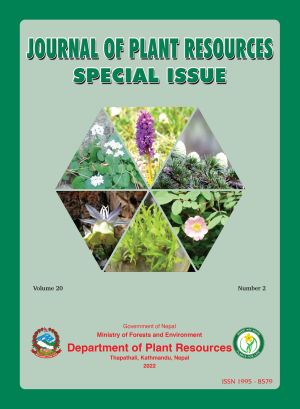Ethnomedicinal Practices of Plants in Danuwar Community of Dudhauli Municipality, Sindhuli District, Central Nepal
DOI:
https://doi.org/10.3126/bdpr.v20i2.57041Keywords:
Ailments, Ethnomedicinal use, Key informant, Sustainable harvest, Traditional knowledgeAbstract
The study aimed to document the indigenous knowledge and practices of using plant materials for medicinal purposes by the Danuwar community in Dudhauli municipality of Sindhuli district, central Nepal. Primary data were collected between October 2016 to January 2017 through key informant interviews and focus group discussion using a semi-structured questionnaire among local healers and various aged groups of people. The information was used to prepare descriptive analysis of plant species. Among 161 plant species belonging to 153 genera and 78 families used for the treatment of different ailments, most dominant family was Fabaceae followed by Lamiaceae and Asteraceae respectively. About two-fifth plants species were used in medicinal purpose for the treatment of 47 different ailments and herbaceous plant habit was widely selected followed by trees and shrubs. The highest number of plant species was used to treat digestive system ailments, followed by skin and integumentary ailments. Common modes of application were oral and poultice, in the form of juice and paste. Among documented plants, two species were reported for the first time having any ethnomedicinal uses and eight species with novel medicinal uses in Nepal. This study showed that Danuwar people still have better traditional knowledge among local healers and elderly people. They preferred conventional medical methods using plant remedies to treat various ailments. Medicinally important plants are under threat from habitat loss and deforestation and people know little about conservation. One third plant species were not protected by concerned people. However, modern medicine and urbanization have a minor impact on the health care system and lifestyles of Danuwars. Hence, it calls for the urgent initiation of conservation and sustainable harvesting of plants.




